The Legacy of Dr. Eitan Neeman: A Life of Compassion and Courage
Few are aware of the miracle that occurred just two days after the outbreak of war when dormant terrorist cells were uncovered throughout the southern region. This revelation was made possible thanks to the dedication of Dr. Eitan Neeman, a senior physician in the intensive care unit at Soroka, and two other fighters. Now, Eitan’s wife Yael shares the heart-wrenching details.
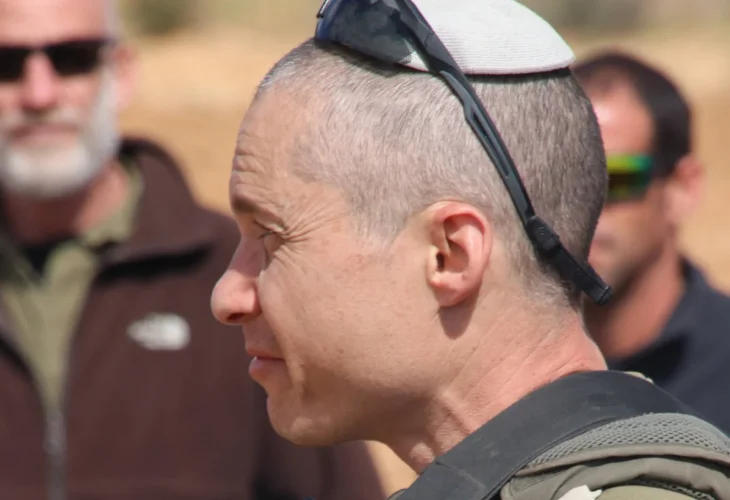
If you looked for Dr. Eitan Neeman, a senior physician in the intensive care unit at Soroka, about a year and a half ago, you'd likely find him moving quickly between patient beds, listening to family members, working vigorously, and showing incredible sensitivity and attentiveness.
In the past year and a half, Dr. Neeman has tragically not been there. He lost his life on the second day of the War of Iron Swords, leaving his wife Yael to share his story of dedication, the legacy he left for her, their seven children, and his department team, the great miracle that unfolded thanks to him, and the unique initiative to commemorate him.
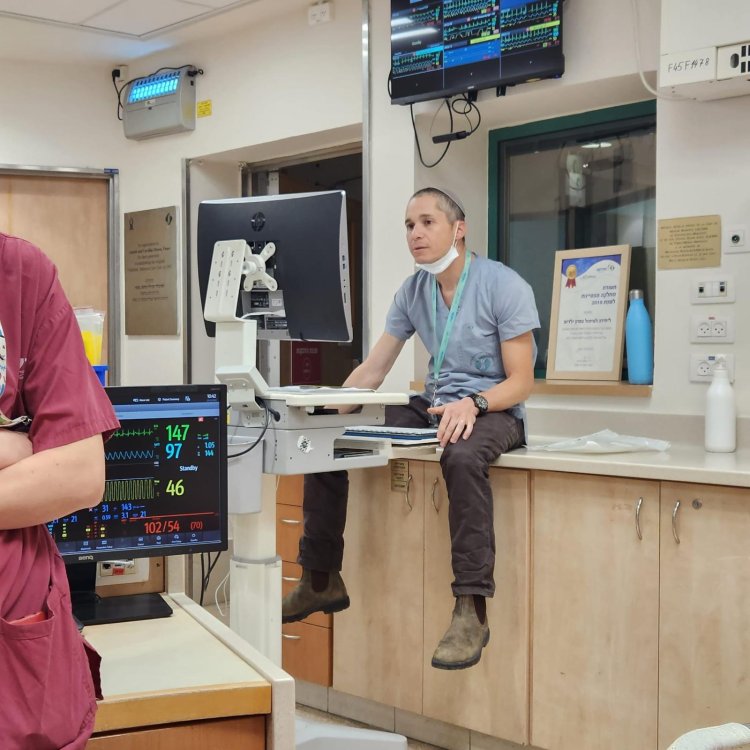
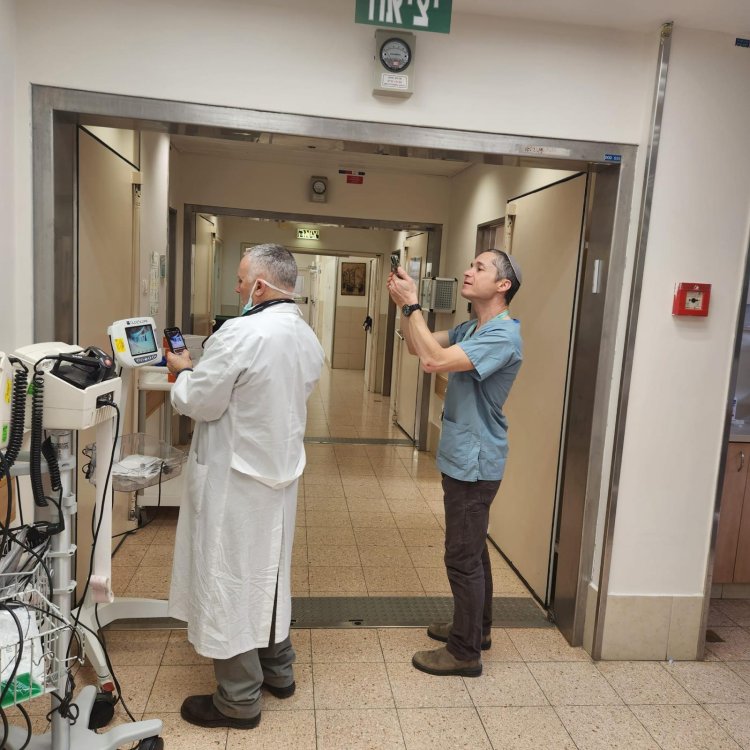
Being a Doctor, Being Human
"Intensive care was Eitan's whole life," Yael says. "He worked there around the clock, with long shifts, yet was always active and joyful, feeling that he was fulfilling the most important mission entrusted to him, and it was no coincidence.
"Not everyone knows, but two days after Eitan started his specialty as a senior physician in pediatric intensive care, we arrived at the unit with our youngest who was severely injured by a car. There is no doubt that Eitan's professional ability combined with our time by our son's bedside in intensive care allowed him to deeply understand what families of patients go through, making him special and sensitive.
"He conducted 26-hour shifts continuously, yet it didn't stop him from engaging in other activities he was passionate about, like managing healthcare advancement projects in the Negev and across the country. He also volunteered at Magen David Adom and the Arad Rescue Unit and served as a physician in Unit 669, doing reserves in the Commando Reserve Unit 551. Alongside all his occupations, Eitan was also deeply connected to the Torah world and aspired to excel in every area he engaged in, including study and halakha."
Yael, professionally distant from the world of medicine, found herself connecting with the families and experiencing their stories through Eitan's tales over the years he worked in intensive care. "After he died, families reached out to me and shared moving stories, like how grateful they were that he was the one to inform them their son had passed. He did it with compassion and so much humanity.
"A mother of a child who was declared brain dead told me: 'It was officially determined as brain death, yet when Eitan came to draw blood, he said to the child, 'I’m sorry I'm hurting you,' and hugged him with incredible sensitivity, even towards a child who couldn't feel or hear anything.
"Incidentally, because Eitan treated the Negev population as a whole, many of whom were Bedouins, he decided early on to learn Arabic fluently. It was important to him that his patients understand him and he them. He always argued that communication is the most basic thing to provide the maximum medical care."
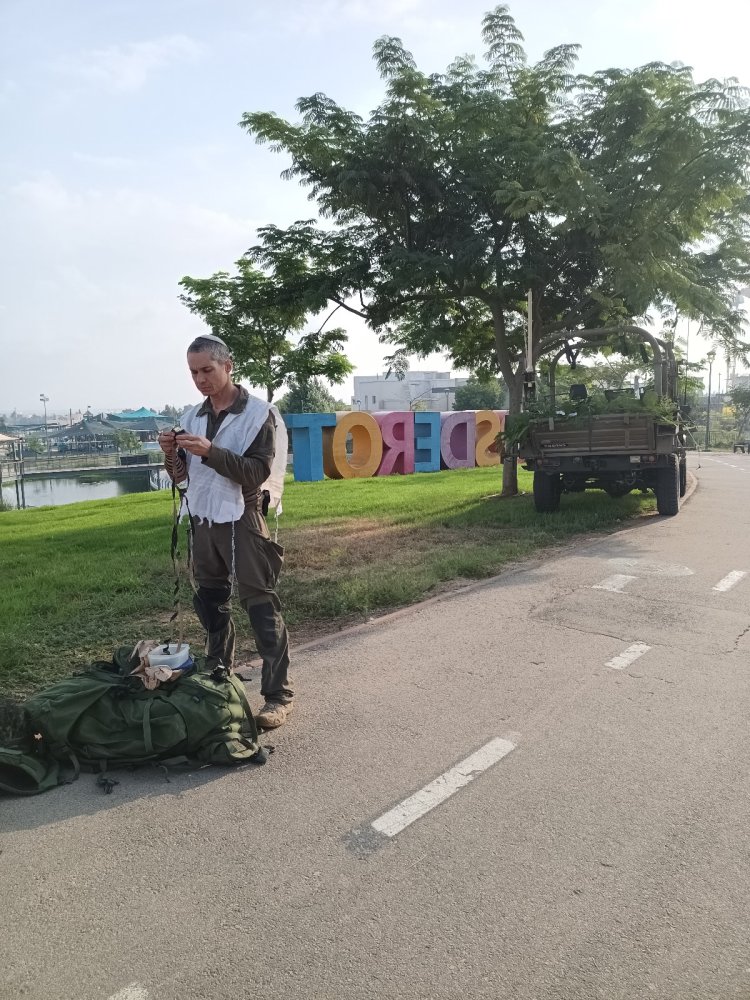 The last photo from the war. Morning before he was killed, putting on tefillin in Sderot
The last photo from the war. Morning before he was killed, putting on tefillin in SderotA Miracle at the Train Station
Yael cannot forget the events of Simchat Torah of that tumultuous year. "It started on Friday when Eitan was on call in the particularly busy department. He came home at nine at night, and because the kids were in prayer and hakafot, we sat for a short talk—our last as a couple. Afterward, there was a holiday meal, and we went to sleep. Eitan woke up at six in the morning to pray vatikin. Half an hour later—at 6:30, the sirens started, and the whole house shook from interceptions. Watching from home over the Be'er Sheva valley, through the window, I saw all the interceptions and bombings, yet was blind to understanding what I was witnessing.
"Of course, Eitan returned from prayer early. Initially, he intended to go on shift at the hospital, but then it turned out he was being called up, and he rushed to gather his military gear while I grumbled: 'How many reserves can you do?' because he really would go to reserves at every opportunity, genuinely seeking them out. I didn't grasp it was something entirely different and that a war was starting.
"Eitan left home, first to Soroka, where he treated dozens of children from the entire area, even before the largest wave of wounded arrived. Then he informed his colleagues he must leave for reserves and simply set out."
Yael pauses, noting that anyone who knew Eitan understood that in such situations, there was no stopping him. "His dream was to be a field trauma doctor, always explaining that the moments when you can be most efficient are in the field, saving soldiers at the moment they are hit. He was certain that reaching the battlefield would be far more effective than working in the hospital.
"The next time we spoke was on Motzei Shabbat, a brief conversation, and the following Sunday, Eitan called. He shared seeing difficult images, and only later did I understand he was then near Kibbutz Nahal Oz. Later he asked to hang up, saying his battery was nearly drained, and I managed to say: 'Take care of yourself,' and heard him seemingly smile back: 'Look, I didn't come here to take care of myself.'
"Eitan spent the night in Sderot, and early the next morning, they were informed of a terrorist identified near the train station in Sderot, and they were to locate him. By this stage, two days after the war broke out, the military was already deployed with forces throughout the area, including tanks and air units, all waiting for that solitary terrorist. Upon spotting him, they shot at him. The terrorists returned fire, killing Avichai Amsalem and Yuval Halevi on the spot. Minutes later, Eitan was also hit and killed."
Yael pauses and reveals something unknown at the time: "It turned out that very close to the incident site was a Hamas dugout with equipment for prolonged stay and a fortified firing position. There was a 'sleeper cell' of terrorists planning to remain there until the army's forces diminished, intending then to attack the residents of Sderot.
"Once the shooting began, the terrorists in the cell, convinced they were being attacked, returned fire, exposing themselves. Due to this incident, dozens of similar outposts were later uncovered throughout the area, each housing five terrorists and long-term equipment. It's hard to describe the magnitude of the miracle here, as the terrorists had a precise and clear strategic plan, intending to attack the entire area. So true, Eitan and two soldiers were killed, but thanks to them, innumerable lives were saved."
What did you experience during those hours?
"I awoke at four in the morning feeling something was terribly wrong. At seven—the hour Eitan was shot to death—I sat on the white swing in the yard that Eitan built on the eve of Sukkot. I felt that something was wrong, a smothering sensation, a lack of air. Eventually, I contacted his friend who does remote healing, asking him to 'treat' Eitan, knowing something was happening, then felt a sharp, piercing pain in my heart. I got up, took my mobile, and sent him a message: 'Eitan?' He didn’t respond, but it later became clear this was exactly when they tended to him and evacuated him to the collection area of the fallen.
"Interestingly, right after this intense pain, an overwhelming sense of tranquility came over me. I felt Eitan was in a safe place, and we spent the day feeling that way. I went to sleep, marking the first time since the war began that I actually drifted off easily.
"At four in the morning, there was a knock at the door, and when my son announced, 'Soldiers are here,' I wasn't anxious. Given it was wartime, they might be advising residents to evacuate. But when I approached the door and saw they were older soldiers, I understood immediately. Before they could even begin, I asked: 'But he didn’t get to do anything yet.'
"Then they told me everything, and slowly stories about Eitan and his deeds came in. My eldest was by my side at the time, and afterward, we woke up the younger children to inform them as well. Since then, our lives changed entirely and nothing returned to what it was. We strive to learn to live without him, to keep rejoicing because we know that's what he would want, yet the heart aches every moment. Each day is like a journey, sometimes unbearably difficult, sometimes filled with beautiful memories of him. Eitan will always be a part of us, in our hearts, in every step we take."
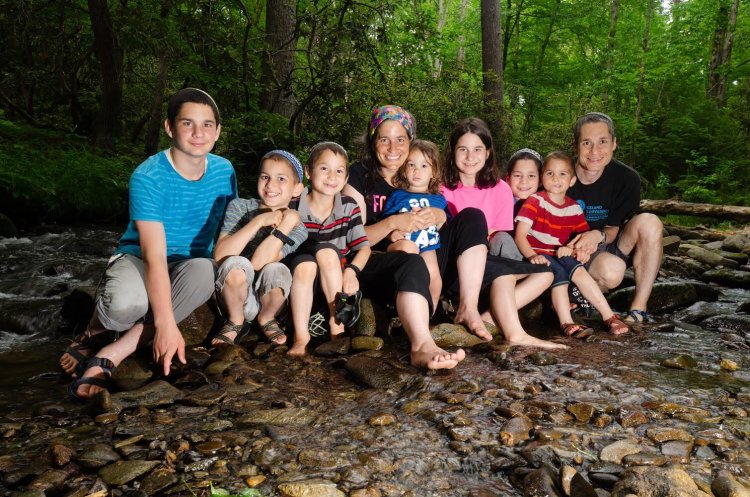

For the Families
Eitan was a senior physician at the department, yet Yael emphasizes that she felt fully immersed in the environment, initially as a mother when her son was hospitalized, then as the wife of a senior ICU doctor.
"Over time, we both recognized how crucial it is for patients to have a familiar face within the hospital," she explains. "Someone who belongs to their community, someone they can trust, consult, and reach through for professional help, because the journey in an intensive care unit is incredibly significant and critical for families, and a liaison who understands their language and culture is essential—to mediate, aid, and even guide.
"During Eitan's lifetime, we talked extensively about this, agreeing that just as there is a casualty officer in every hospital bridging between the wounded soldiers’ families and the staff, so too should there be staff members from every community according to its style and spirit, as long as they speak its language."
Doesn’t this exist in the country?
"We found that many hospitals worldwide have such personnel, yet, unfortunately, this doesn’t exist in our country. This is why when considering how to commemorate Eitan, I felt the best tribute would be a project to realize this vision. Eitan always spoke of the impact a proper liaison could have in building trust with the team and, consequently, improving treatment and assisting the patient."
How will the program be conducted?
"The goal is to select up to 20 staff members from different communities throughout the country each year, providing them suitable training through Ben-Gurion University. The training will last several days, involving medical education alongside lectures, simulations, and exercises. We’ve already launched the initiative and are now working to extend it to all hospitals nationwide, which requires us to raise substantial funds. We hope to soon meticulously and fully launch the program."
Does this initiative alleviate the pain of loss?
"No, there is no cure for the yearning and pain," Yael answers. "It is a pain that will always accompany us, yet the activity gives a sense that good things are happening and the world is on its way to becoming better. It amplifies hope, and what more do we need these days?"

